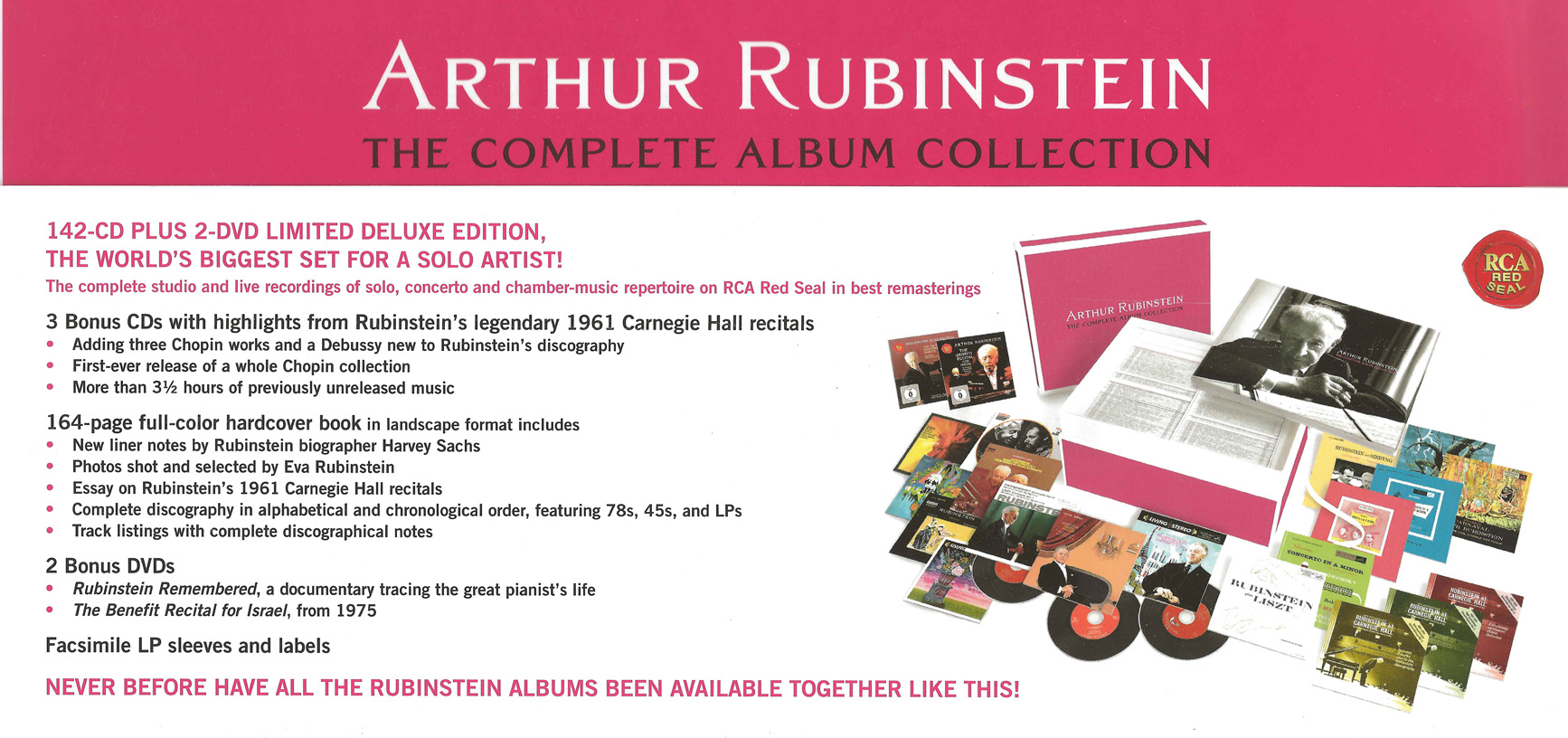Franz Schubert: Four Impromptus, op.90, D.899
Media Review / Listening Diary 2015-10-31
2015-10-31 — Original posting
2016-08-13 — Brushed up for better readability
Table of Contents
Introduction
The Impromptus in my LP Collection
I have listened through my recordings of the 4 Impromptus op.90 (D.899) by Franz Schubert (1797 – 1828) in preparation for an upcoming piano recital (that I’m supposed to review). With these pieces, my discography is rather slim, consisting of recordings by Arthur Rubinstein and by András Schiff only, see below. In my basement, I still have LPs with these pieces, featuring Wilhelm Kempff (1895 – 1991) and Andor Földes (1913 – 1992) — I haven’t listened to these in over 30 years and don’t have immediate plans to “resurrect” these on CD.
The CDs
Let me first present the CD labels & information:
Arthur Rubinstein (1928)
Arthur Rubinstein — The Complete Album Collection
CDs #1 – 5: The Early Recordings 1928 – 1935
SONY Classical 88691936912 (142 CDs / 2 DVDs, mono / stereo); ℗ / © 2011
Documentation 162 pp., track listing on CD sleeve

Arthur Rubinstein (1949)
Arthur Rubinstein — The Complete Album Collection
CDs #11 – 14: The Early Recordings 1938 – 1949
SONY Classical 88691936912 (142 CDs / 2 DVDs, mono / stereo); ℗ / © 2011
Documentation 162 pp., track listing on CD sleeve

Arthur Rubinstein (1950)
Arthur Rubinstein — The Complete Album Collection
CD #32: Rubinstein Encores
SONY Classical 88691936912 (142 CDs / 2 DVDs, mono / stereo); ℗ / © 2011
Documentation 162 pp., track listing on CD sleeve

Arthur Rubinstein (1958)
Arthur Rubinstein — The Complete Album Collection
CD #86: Mozart: Piano concerto K.453; Schubert: Impromptus D.899 Nos. 3 & 4
SONY Classical 88691936912 (142 CDs / 2 DVDs, mono / stereo); ℗ / © 2011
Documentation 162 pp., track listing on CD sleeve

Arthur Rubinstein (1961)
Arthur Rubinstein — The Complete Album Collection (1961)
CD #141: Rubinstein at Carnegie Hall — Recorded during the historic ten recitals of 1961
Busoni-Bach: Chaconne; Brahms: Piano sonata #3 op.5, Intermezzi op.117/2, 118/2 & 118/6
Chopin: Mazurka op.33/2, Nocturne op.27/2; Schubert: Impromptu D.899/4
SONY Classical 88691936912 (142 CDs / 2 DVDs, mono / stereo); ℗ / © 2011
Documentation 162 pp., track listing on CD sleeve

András Schiff (1990)
Schubert: Piano Sonatas D.958, 959, 960; 4 Impromptus, op.90 (D.899)
Decca 475 184-2 (2 CDs, stereo); ℗ 1992/94/95 / © 2003
Booklet: 16 pp. en/fr/de

Franz Schubert (1797 – 1828): 4 Impromptus op.90
In 1827, a year before he died, Franz Schubert (1797 – 1828) wrote 8 pieces now known as Impromptus (the name “impromptu” was apparently added by the editor). These pieces appeared in print in two groups: the 4 Impromptus, op.90 (D.899), appeared in Schubert’s lifetime, the second group (4 Impromptus, op.posth.142 / D.935) only after the composer’s death. Just months before his death, Schubert composed three more pieces for piano, which are now known as D.946. One might count these as Impromptus as well.
Here are the 4 Impromptus in op.90:
- No.1 in C minor: Allegro molto moderato (4/4)
(modulates to C major) - No.2 in E♭ major: Allegro (3/4)
(middle part in B minor) - No.3 in G♭ major: Andante (4/2)
- No.4 in A♭ major: Allegretto — Trio (3/4)
(the Trio part is in C♯ minor; it consists of two parts, both with repeat signs)
One can find more details about these pieces through Wikipedia and references therein. I won’t discuss the nature of the pieces, but just briefly report my impressions from the interpretations on the above CDs.
The Interpretations
The Artists
Arthur Rubinstein did not record these pieces (nor probably play in concert) as an entire group: the only recordings that exist are from Impromptus No.3 and 4 — both were apparently used as encores in concerts (No.3 was recorded twice, in 1949 and 1958, No.4 even exists in four recordings, from 1928, 1950, 1958, and a live recording from 1961). Sir András Schiff recorded the Impromptus op.90 in 1990, on a Bösendorfer 290 Imperial — they were published on CD as part of his complete Schubert sonata recordings that he made between 1993 and 1995. Let me tackle the op.90 by piece, rather than by artist:
Impromptu No.1 in C minor
András Schiff, 1990
Duration: 10’13”
Well, unfortunately, it looks like this recording (of the four Impromptus) falls in line with my findings from other recordings: that first Impromptu is played diligently, carefully, but — frankly — fairly boring and lengthy. One concrete objection I have is that it’s too diligent, also too predictable and controlled, e.g., Schiff appears to teach us that the articulation here is to be arpeggiando — and he uses it abundantly, and predictably, which I think is about as bad as permanent, strong vibrato or constant use of portamento on string instruments.
Overall, it’s also emotionally too controlled — I don’t get “pulled in”: I don’t think it’s good enough to “let the music speak for itself” — I want to be touched, shocked, moved by the abysses that open up in the music from Schubert’s late years!
Rating: 3
Impromptu No.2 in E♭ major
András Schiff, 1990
Duration: 4’53”
Same as above, essentially: the articulation is excellent and detailed, the dynamic annotations are followed to the finest detail — but it remains emotionally tamed, controlled — too controlled. The permanent arpeggiando is hurting less here, bit I think there is more to this piece than Apollonian serenity!
Rating: 3
Impromptu No.3 in G♭ major
Arthur Rubinstein, 1949
Duration: 4’31”
An early interpretation by this artist — and not his best one: too fast, almost like a virtuoso piece. The melody voice does sing nice, even the occasional counter point in the bass — but the sextuplet quavers in the middle voice remain too prominent, rather than just being accompaniment. This feels rather like a Song without Words by Felix Mendelssohn Bartholdy. At least, one can argue that Rubinstein adjusted the tempo for the melody voice, and that he observed the Andante annotation for the 4/2 meter.
Rating: 3
Arthur Rubinstein, 1958
Duration: 6’12”
Nine years later with the same artist — and what a change! Not only does he play this much slower, but also the middle voice (quaver sextuplets) is now taken back to accompaniment level. Also, there’s much more emotional depth, distinct agogics, and the dialog between the outer voices is shown / played out very well — excellent, even touching; also, despite the slower tempo, the melody hasn’t lost a bit (quite to the contrary!), and the piece still feels Andante!
Rating: 5
András Schiff, 1990
Duration: 5’22”
Technically well-played and dynamically well-balanced, but far too smooth, emotionally too flat.
Rating: 3
Impromptu No.4 in A♭ major
Arthur Rubinstein, 1928
Duration: 4’28”, no repeats
Among the artist’s first recordings, and typical early Rubinstein: omitting all repeats, fast, often superficial in the articulation, excessive in the rubato, but dramatic (almost overblown at that tempo) — in my opinion this misses the essence of Schubert’s piece.
Rating: 2
Arthur Rubinstein, 1950
Duration: 5’25”, first repeat only
In this and the subsequent recordings, Rubinstein plays the first repeat in the Trio, but omits the second one — most likely also because for an encore (and the recording was explicitly labeled “Rubinstein Encores”), the piece is long enough already. Here, Rubinstein pays attention to clear articulation, he uses far less rubato, nicely plays out the melody voices — but as in Impromptu No.3, the semiquaver voice / accompaniment is a bit too extroverted and prominent. It’s not a bad interpretation, though, with more emotional depth than Schiff’s.
Rating: 4
Arthur Rubinstein, 1958
Duration: 6’41”, first repeat only
Over about the same time as the two recordings of No.3, there is a similar, albeit less dramatic evolution in Rubinstein’s interpretation: the tempo is slower, the articulation even more careful, the voices dynamically more balanced — the focus is on expression, the emotional climax clearly in the Trio — very nice!
Rating: 5
Arthur Rubinstein, 1961
Duration: 5’27” without the applause, first repeat only
This is only three years later than the previous recording — but it is a live recording (from Rubinstein’s series of 10 recitals at Carnegie Hall in 1961), hence not strictly comparable to studio recordings (besides the obvious noises from the audience, there are also limitations to the sound quality). The interpretation is fairly close to that from 1958, the tempo slightly faster; it’s a valuable document, of course — but from the distance of listening to reproductions on CD (and not having attended that concert), the 1958 recording offers me more, and a richer listening experience.
Rating: 4
András Schiff, 1990
Duration: 7’51”
The longer duration here is not just because Schiff plays both repeats: this is clearly the slowest interpretation of No.4; once more, it is articulated and played very carefully, and to the finest details in the annotation — to the point that it is difficult to have concrete objections, but… see above! To some degree — much more than Rubinstein’s recordings — this makes me longing for the irregularities, the fragility, the vastly richer sound of an interpretation on a period instrument.
Rating: 3
The ratings are relative, as usual in my blog.
Summary
- András Schiff: smooth, inadequate Apollonian serenity, ex cathedra / almost dogmatic — fails to touch my heart!
- Arthur Rubinstein: I think his 1958 recordings in particular are excellent — conventional in many ways, but they capture the spirit of the pieces as well as a modern concert grand permits. Too bad Rubinstein did not record all the Impromptus!
Listening Diary Posts, Overview











